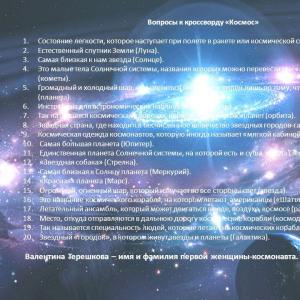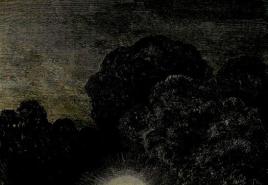An insidious soft sign after the hissing ones. In what cases is it written? Spelling of nouns Many puddles as spelled with a soft sign
Note.Letter b before O written in some foreign words, for example: battalion, bouillon, guillotine, Carmagnole, companion, minion, pavilion, postman, champignon.
§ 72.Letter b written to indicate the softness of a consonant, except h, sch(see §75), at the end of a word, for example: drink, darkness, horse, and in the middle of the word before hard consonant, For example: threshing, request, nurse, less.
To indicate the softness of a consonant that comes before another soft consonant, b is written in the following cases:
- If, when a word is changed, the second soft consonant becomes hard, and the first consonant retains its softness, for example: nannies(nurse), wedding(wedding), eight(eighth).
- To indicate softness l, For example: herring, flatter, smaller, finger.
In all other cases, before soft consonants, including before h, sch, letter b is not written, for example: bones, early, babysit, tip, mason.
Note.Between two soft ones l letter b not written, For example: illusion, boisterous.
§ 73. Letter b also written in the following cases:
- In those formed from numerals five, six, seven, eight, nine complex numerals in which both parts are declined, for example: fifty(fifty, fifty) sixty, seventy, eighty, nine hundred, But: fifteen(fifteen, fifteen) sixteen etc.
- In instrumental plural forms, for example: children, people, Also four.
- In an indefinite form before -xia and in imperative mood before -xia And -those, for example: drink - get drunk; fix it - mend your ways, fix it; suspension - weigh yourself, weigh.
§ 74. Letter b not written:
- In adjectives with suffix -sk - formed from nouns in b, For example: Kazan(Kazan), Kemsky(Kem), Siberian(Siberia), brutal(beast), January(January).
- In the genitive case plural from nouns to -nya with a preceding consonant or th and in those formed from them using the suffix -To - diminutives, for example: cherry - cherries, cherry; slaughter - slaughterhouse; reading room - reading room; but: bathhouse - baths, bathhouse; apple tree - apple trees, apple tree; also village - villages, village; young lady - young ladies; kitchen - kitchens, kitchenette.
Note.Adjectives September, October, November, December, June, day (day-day) are written with b; Adjectives derived from Chinese names are also written in the same way. -ny , For example: Yunnanese(from Yunnan).
§ 75.After the sizzling (and, h, w, sch) letter b written only in the following cases:
- At the end of feminine nouns in the nominative and accusative case singular, for example: rye, night, mouse.
- At the end of the 2nd person singular present and future tense of verb after final w, For example: you carry - you carry, wear - wear, you will accept - you will accept.
- At the end of the verb in the singular imperative mood, and letter b is preserved before -xia , For example: smear - smear; hide - hide; eat.
- In the plural imperative before -those, - be careful, For example: smear - smear ; hide - hide ; eat.
- At the end of a verb in an indefinite form, and letter b written before -xia, For example: cut, get a haircut.
- In all dialects after the final w And h , For example: completely, gallop, away, and also in the adverb wide open.
- At the end of the particles: you see, I mean, only, look.
The soft sign is probably the most mysterious letter in the Russian language. It does not indicate a sound; it is not classified as a vowel/consonant. Why is it needed then? It turns out that her role in our writing great. In this article we will figure out when “b” is used after sibilants with nouns, adverbs and verbs.
Nouns. Soft sign after sibilant consonants
The exact writing of the soft sign located after these consonants causes the greatest difficulty, since it is not clear by ear whether it needs to be written or not.
It turns out that the rule is very simple: a soft sign after the hissing ones. noun written only in the words of wives. genders belonging to the 3rd declension.
The words “oven”, “speech”, “daughter”, “night”, “game” are feminine, have a nominative case and are in the singular. Therefore, we must definitely write “b” in them.
But be careful: they should not be confused with words of the 1st declension, which are in indirect cases: “many clouds”, “no tasks”, “several heaps”. All of these words would seem to be feminine and should probably be classified as 3rd declension.
But let's take a closer look: they are in the genitive case. If we raise them to the initial form (“cloud”, “task”, “heap”), then we will be convinced that they belong to the first declension, which means they do not obey this rule.

There is another “trap” in the Russian language, where under no circumstances should a soft sign be used after hissing words. Words ending in a hissing consonant, but belonging to the second declension, are not written with “b” (“rook”, “doctor”, “cloak” - 2nd cl.). Therefore, ask the question to the noun more carefully. Do this before determining the declension, since gender depends on it. noun, and number.
When do we write “b” for adverbs?
An adverb is one of the unchangeable parts of speech. It is not declined, no endings are distinguished in it. The spelling of “b” in adverbs is not subject to any difficult rules.
- In those adverbs that end in a consonant “sh” or “ch”, a soft sign is always written. For example: “jump up”, “exactly”.
In adverbs starting with “zh”, it is never written. An exception would be the word “wide open”.
- Another rule that the adverb is subject to: a soft sign after hissing ones is always used, with the exception of “already”, “married”, “unbearable”. Undoubtedly, such a humorous sentence is easily remembered by schoolchildren, especially girls.

It’s not so important which rule you remember, the main thing is that both reflect the essence of spelling adverbs.
Verb and soft sign after sibilants
The verb is one of the most commonly used parts of speech, without which our language would be very poor. Spelling “ь” with verbs causes a lot of difficulties not only for students, but also for adults.
- If the verb is in indefinite form(infinitive) ends in a sibilant, then “ь” in this case will always be written. And here without any exceptions. “Take care”, “bake”, “burn”. It will also be stored in a reflexive form, before the postfix “-sya”: “to get carried away”, “to light up”, “to be careful”.
- All 2nd person singular verbs use a soft sign. This applies both to the present tense: (“you are now”), “writing”, “drawing”, “walking”, “sleeping”, and to the future: (“you are tomorrow”) “working”, “thinking”, “finishing” ", "you'll redo it." The soft sign will also be preserved before the postfix “-sya”: “you will like”, “you will use”, “you will touch”, “you will gain”, “you will take shape”. In verbs that are in the imperative mood and end in a hissing consonant, a soft sign is always written: “cut”, “eat”, “smear”, “hide”. Before the plural postfix “-te”, it is necessarily preserved: “designate”, “cut”, “hide”.
Before the postfix “-sya” it also does not disappear: “take comfort”, “don’t cut yourself”.

And again, be careful and do not fall into the “trap” of the insidious Russian language! The words “cry” and “cry” are completely different parts of speech, and therefore are written differently.
“Crying” without a soft sign is a noun of the 2nd declension, and, accordingly, a soft sign cannot be written in it. But “cry” with a soft sign is an imperative verb, and, as you know, we always write “b” in them. All this can be easily guessed from the proposed context, in which the meaning of the word will become clear.
Conclusion
The soft sign after sibilants is used with many parts of speech. Knowing simple rules, you will never have trouble spelling it after these consonants. If you suddenly forget some nuances, our article will remind you of them.
A large set of materials for the lesson on L after sizzling (presentations, tests, cards, games, dictations and much more)
10 words for rule b after sibilants
For 2nd - 3rd grade: nonsense, rye, mouse, stove, doctor, comrade, hut, and behind the clouds, many tasks, around the dachas.For 4th grade: mouse, speech, doctor, comrade, hot, and behind the clouds, many tasks, guard, bathe, you know.
For grades 5 - 7: false, alkali, comrade, only, many tasks, guard, bathe, smear, gallop, hot.
25 words for rule b after sibilants
For 2nd - 3rd grade: nonsense, rye, mouse, oven, lie, louse, thing, brooch, gouache, ball, doctor, comrade, bream, tick, circus performer, weaver, trickster, kalach, executioner, strongman, hut, from behind the clouds, many tasks, There are a lot of puddles around the dachas.For 4th grade: mouse, speech, luxury, bile, trifle, youth, trumpeter, rich man, bearded man, dodger, pusher, circus performer, kalach, hot, fresh, from behind the clouds, many tasks, gears, monsters, guard, captivate, swim, write, you read, you know.
For grades 5 - 7: false, alkali, buckshot, trifle, luxury, comrade, radio beam, hoop, Muscovite, many tasks, programs, monsters, guard, captivate, swim, write, read, know, spread, cut, just, jump, wide open, unbearable, hot , fresh
Lists of individual rule clauses
Nouns
Feminine, 3rd declension
Mouse, daughter, speech, falsehood, nonsense, youth, oven, rye, lie, louse, rags, thing, brooch, bald spot, gap, game, wilderness, trifle, alkali, dryness, help, medical assistance, self-help, mutual assistance, technical assistance, bitterness, night, midnight, gouache, power, wasteland, quiet, luxury, bile, bastard, ink, retouching, thickness, flow, buckshot, harness, harness, harness, lie, stupidity, whim, trembling.
Feminine, plural h.
A lot of skis, dachas, clouds, sales, sales, meetings, successes, failures, transfers, hernias, monsters, monsters, transfers, extraditions, galoshes, beaters, Ksyusha, Pash, Dash, Sash, puddles, prey, carcasses, conflagrations, candles , prize-winners, foremans, paws, paws, lifters, thousands, nags, tasks, missing, shoulders.
Masculine, 2nd declension
Hunchback, trumpeter, grabber, rich man, stag, planer, twitcher, scarecrow, tractor, auto tractor, bearded man, dodger, pusher, circus performer, weaver, trickster, kalach, executioner, strongman, crying, interpreter, basmach, cosmach, kumach, rhymer, zurnach, trepach, violinist, doctor, female doctor, chief physician, medical doctor, military doctor, veterinarian, nutritionist, rook, cedar, nosach, mustache, laugher, reckless driver, listener, sword, scourge, sandwich, prince, crown prince, prince, krivich, Muscovite, Dregovich, Ryadovich, Pskovich, Popovich, kinsman, kinsman, erofeich, princely, paralysis, cry, kulich, radimich, kostromich, brick, match, barich, gentry, lyutich, vyatich, cootchich, french, clinch, svetoch, grub, tornado, match, ketch, sketch, putsch, universal education, head teacher, sealing wax, ignorant, beam, radio beam, hoop, panych, snake Gorynych, hrych, owl, key, ball, coven, lavash, Chuvash, legash, huckster, pencil, czardash , face, drunk, broadsword, jumble, hut, ours, murash, cartridge belt, ladle, bell-bottom, kulesh, dervish, Yiddish, fig, crumb, sultana, finish, fetish, shish, hashish, baksheesh, revenge, rematch, kart -blanche, punch, brawl, penny, aprosh, mackintosh, march, demarche, minced meat, ruff, bursh, Ingush, shower, kush, carcass, kuntush, cartouche, scraped, ragged, liner, last, foundling, miscarriage, lily of the valley, gnawed , embryo, berdysh, stray, baby, round baby, naked, reed, adopted, fattened, fosterling, bastard, foundling, little snake, foolish, little animal, gosling, cub, kitten, duckling, blackling, ugly, mole rat, strong one, bratty, silly , profit, maggot, gain, loss, win, draw, win back, runny, pellet, pellet, lett, shorty, changeling, rolled up, pouty, whooping cough, plush, round, belyash, goulash, nephew, curly, raincoat, sling, bream , tick, fistula, comrade, companion, vegetable, horsetail, borscht, khrushch, whip, pimple, ivy, cartilage.
Adjectives
Hot, viscous, smelly, handsome, free-flowing, flammable, prickly, good, feisty, fresh, burning, molting, powerful, effervescent, lean, seething, odorous, creaky, creeping, omnipresent.
Adverbs
Backhand, backwards, completely, wide open, completely, away, galloping, awkwardly, exactly.
Exceptions: I can’t bear to get married.
Particles
Look, look, look, just...
Verbs
Infinitive
Burn, lie down, clothe, bring on, extract, bake, neglect, protect, guard, utter, mark, flow, burn, cut, shear, reach, drag, pound, soak, strain, strain.
2nd person verbs
You smile, feed, bite, kick, drink, pour, sleep, eat, love, kiss, move, nod, use, write, read, wash, use, weaken, move, hold, see, know, fly, grieve, heal, you are registered, you study, you use, you can, you repent, you guard, you extract, you burn, etc.
Imperative verbs
Smear, cut, eat, appoint, don't cry, hide, respect, provide, reveal, summarize, multiply, worry, focus.
b is stored before: smear, smear, hide, hide, etc.
Certificate of publication No. 1356502 dated 05/31/2017
The soft sign is one of those letters that often makes the writer have difficulty choosing the correct spelling. Moreover, several types of spellings are associated with it. Let's try to deal with one of them.
Why do you need a soft sign?
The soft sign does not indicate any sound. Nevertheless, we use it quite often in writing.
The soft sign in Russian is never used after a vowel, И or at the beginning of a word.
Soft sign performs three main functions :
- denotes softness of consonants in the middle before consonants and at the end of a word ( softening sign).
- indicates that E, Yo, Yu, Ya after a consonant indicate two sounds; also “separates” the consonant and the following I, sometimes O ( separator mark).
- helps determine grammatical features words (after sibilants at the end of the word - grammatical mark).
It is about the spelling of the soft sign after the hissing ones that we will now talk about.
Why do you need a soft sign after the hissing ones?
So why do we write a soft sign in the field of hissing words at the end? After all, it cannot separate anything (there is no vowel after it).
It cannot perform a softening function either: all hissing ones are either always soft (why do they also need a soft sign?), or always hard (and the soft sign is not able to change this situation).
To answer this question, let's look at the words.
Suppose there are such words: chuch, myash and kick. These are nouns. Can we determine their gender and declension?
We can say with confidence that the word “chuch” is feminine in the 3rd declension, and “myash” is masculine in the 2nd declension. It’s impossible to say anything about “ping”. Why? Because we know: only in feminine nouns of the 3rd declension, after sibilants, a soft sign is written at the end. And after other letters - not hissing ones - it can be written in both the 3rd declension (steppe) and the 2nd (horse). And this is understandable: after other consonants paired in hardness and softness, the soft sign denotes softness, and not a grammatical category.
A soft sign in itself cannot be the ending of a word, although it stands at the end; it can be part of the ending (-eat, -ish) or the root (mouse, bake, cut, wide open).
Rules
The spelling of a soft sign after a sibilant at the end depends on the part of speech. Therefore, before writing or not writing b, we need to determine which part of speech is in front of us. Some of the rules related to this issue are studied in elementary school(soft sign at the end of nouns and in verbs 2nd person singular), part - in 5th grade (writing short adjectives), part - in the 6th grade (imperative verbs) and, finally, adverbs and particles are considered in the 7th grade.
So, a soft sign at the end after the hissing ones is written:
- Nouns have 3 declensions: daughter, dry land, wasteland, help.
- In verbs, the 2nd person singular, in the imperative mood and in the indefinite form - that is, wherever a soft sign can appear at the end of a word after a hissing one: lie down, find out, appoint.
- In adverbs (exceptions: I can’t bear to get married): back, backhand, away.
- In some particles: just, you see, you know.
The soft sign in verbs is preserved before -sya or -te: appoint, bake, break up.
Soft sign not written:
- Nouns have 2 declensions: baby, raincoat, crying.
- In nouns of the 1st and 2nd declension in the plural genitive case: clouds, shoulders, groves.
- In short adjectives: powerful, tenacious, lily.
- In adverbs that are exceptions: I can’t bear to get married.







